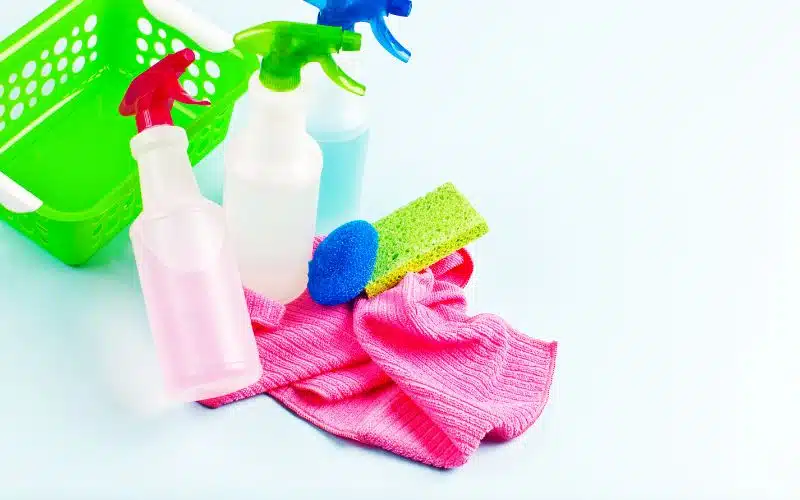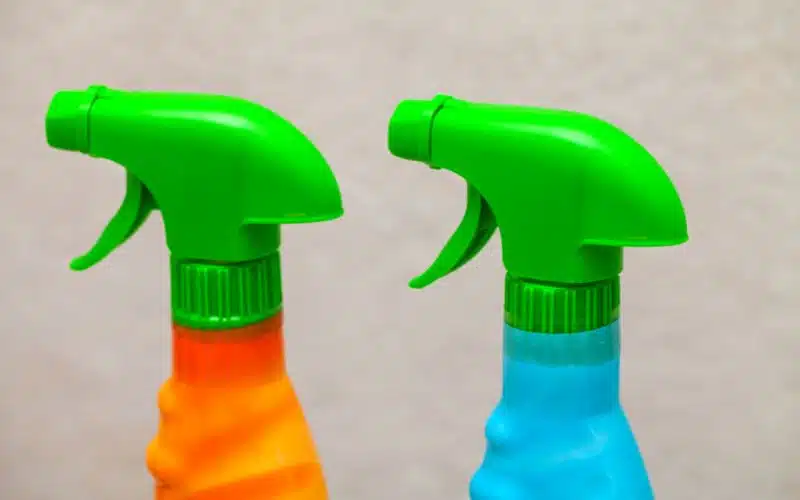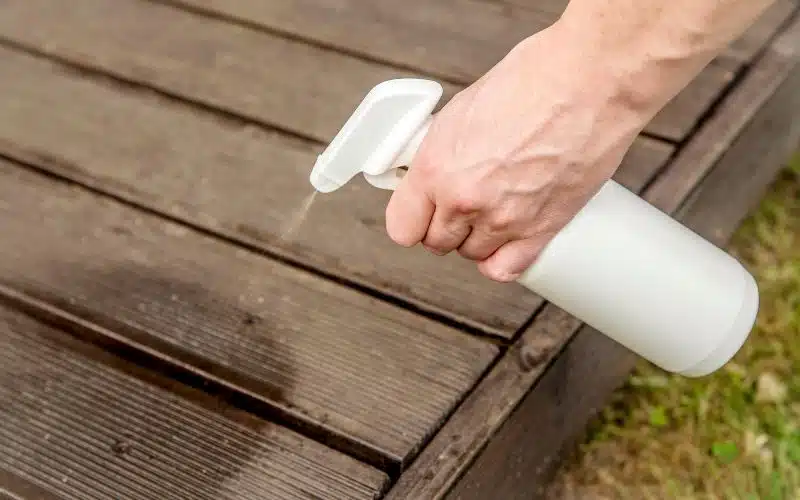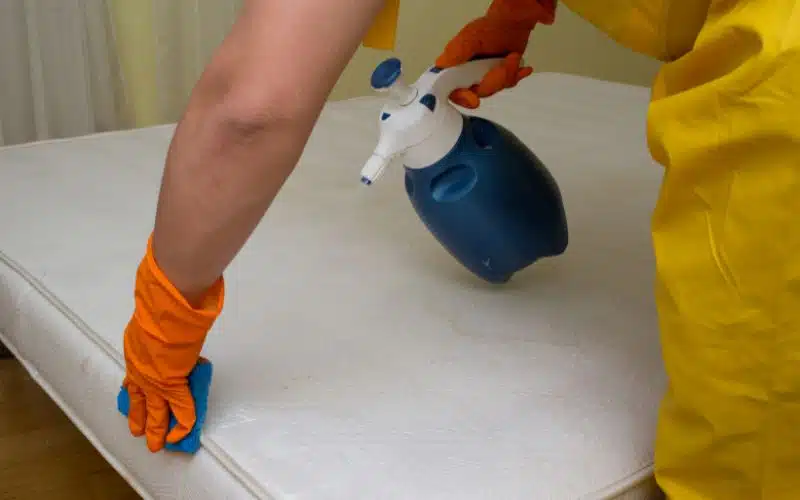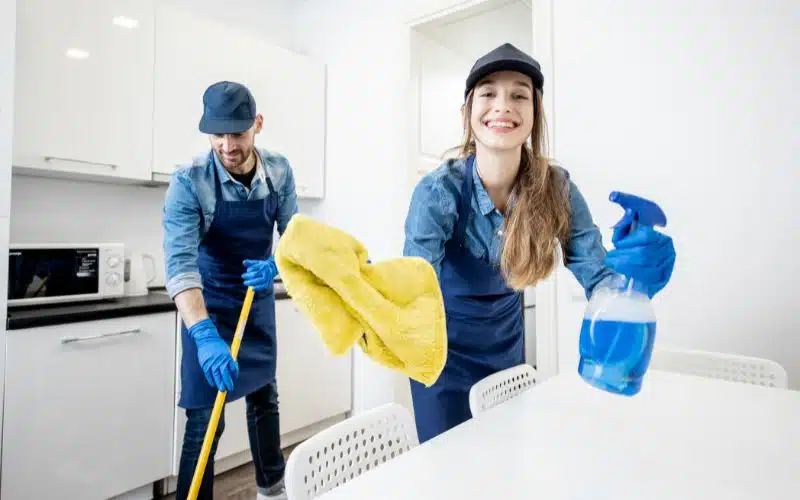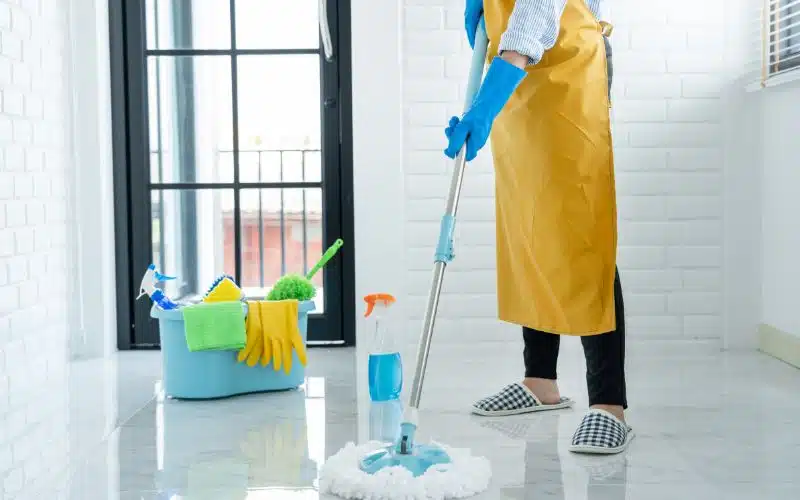Different gases have diverse odors. The chlorine smell is similar to that of Ammonia. It’s pungent, and the olfactory senses go haywire when it’s near.
The smell is quite unpleasant and causes eye and skin irritation. The chlorine smell in the house is due to several causes, which can cause harm if you don’t take care.
First, when you inhale the smell, it causes breathing difficulty, resulting in loss of consciousness. Therefore, there’s a need to identify the cause of the smell to get the solution.
Various factors in the home cause the air to smell like Chlorine. Bleach is one of the most common culprits for the chlorine smell in your house. Chlorine is an active ingredient in bleach used in many households.
Chlorine Smell in House Water
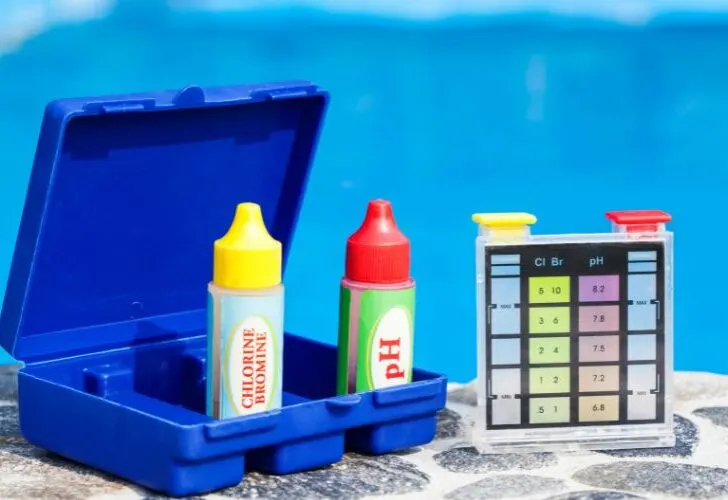
When you smell Chlorine in your water, your first thought is, “Did bleach get into my water supply?” Many people associate Chlorine’s smell with bleach, which is not wrong.
What’s wrong is to think your water smells because you poured bleach in it, whereas you didn’t.
Chlorine is one of the chemicals used during the filtration of water. It makes water safe to drink as it eliminates water microorganisms.
Hence, the chlorine smell in your house water results from high amounts of Chlorine used to disinfect your water.
Your water can contain small amounts of Chlorine as it isn’t harmful; thus, it’s added during water treatment. However, too much Chlorine in the water can be disturbing and deem the water unsafe.
Thankfully, you can remove the Chlorine by:
- Refrigerate a jug of water for 20 minutes or more, and the smell will vaporize.
- Boil the water for five to ten minutes before drinking.
- Use dechlorination tablets or vitamin c tablets to remove the excess chlorine in the water.
- Contact your utility company and complain about the Chlorine in your water supply.
- Add a slice of lemon or a drop of lime juice to your water.
- Use water filtration directly to your faucet.
- A carbon filter is another tool you can use to remove the Chlorine and deem your water safe.
As long as you can use the above methods to eliminate the excess Chlorine in your water, you don’t have to worry about any other damages.
Suppose you’re thinking about plumbing damages, then-No. Chlorine doesn’t damage your plumbing system, so it’s not the cause of your pipes deciding to get spoiled.
Chlorine Smell in House Furnace
Typically, your furnace should provide clean and fresh air in your home. It should run quietly and not emit a pungent odor.
But lately, you notice a particular odor whenever you turn on the furnace. Sometimes, it’s a faint whiff and comes full force on other days.
No matter how faint the odor is, you must identify the cause and find the solution. Eliminating the causes of the smell will keep your family safe.
For example, one of the common smells your furnace emits is Chlorine. You might catch a whiff of the smell even if you didn’t use bleach. The chlorine smell in the house furnace results from an electrical surge.
Old furnaces need high electrical energy to work, bringing about the reaction which gives off ozone – thus, your chlorine smell—inspecting your furnace immediately to notice this odor would be best, as the surges can cause sparks that lead to a fire.
Therefore, you can eliminate the chlorine smell in your house furnace by scheduling regular maintenance for your home.
It’ll help you see the worn motors of the furnace and, of course, change them.
Chlorine Smell in Room
Chlorine has several household uses, although it’s necessary to understand how harsh it is. The Chlorine smell in your room should result from using bleach for dry cleaning and washing.
If it’s pretty intense, then it’s one of these causes.
- The chlorine gas mixes with other chemicals and finds its way into your room.
- Your swimming trunks are kept somewhere in your room
- There’s an electricity surge in your house furnace.
- The water supply in your toilet has excess Chlorine.
A robust and pungent chlorine smell in your room causes several health conditions like a chemical burn, inflamed skin, chest pain, vomiting, and suffocation.
Thus, you’ll have to remove the odor immediately when you smell it in the room. In addition, it would help if you did the following to prevent the chlorine smell in your room.
#1. Don’t Mix Your Chlorine Bleach
Mixing chlorine bleach with other chemicals can cause accidents. You shouldn’t mix chemicals like Ammonia or products containing acids with Chlorine to prevent health risks.
Instead, you can use the chlorine bleach alone for your washing and ensure to use it appropriately.
Vinegar, urine, and hydrogen peroxide are other products that can release chlorine gas if you mix them with bleach.
#2. Use the Appropriate Amount of Chlorine in the Pool
Chlorine is an effective disinfectant, and that’s why it’s used in pools to eliminate bacteria. However, it would be best to use Chlorine adequately to prevent skin irritation while swimming.
Also, use protective gear while in the pool. In addition, you shouldn’t leave your clothes lying around after swimming.
Instead, pile them in the washing machine and remove the chlorine smell with clear soap.
#3. Regular Maintenance
Your furnace tends to emit Chlorine when it’s old and its parts are worn-out. Hence, you should schedule regular maintenance to prevent an electric surge in the room furnace, which can emit Chlorine.
#4. Call Your Local Utility Company
If the water in your home stinks of Chlorine, you can call your utility company. The company will reduce the Chlorine added during water treatment, and your water will be free of the pungent smell.
What Could Cause a Chlorine Smell in the House?
There are several causes of the chlorine smell in the house. Chlorine bleach is the most typical reason since various households use it.
Many industries use Chlorine for its affordability and efficiency in eradicating bacteria and other microorganisms. Nevertheless, there are other causes of chlorine smell in the house.
They include;
#1. Mixing Chemicals
Your house smells like bleach when you use it in excess or mix it with other cleaners.
The mixture can start a chemical reaction with the release of chlorine gas, which is why your house gives a strong odor.
Chlorine reacting with any acid can form chlorine gas. Therefore, you shouldn’t mix bleach with other cleaners.
It’s advisable not to mix bleach or household cleaners for safety because you don’t know what chemical reaction they might start. If you miss them, ensure you open your windows and doors to allow more airflow.
#2. Chlorine In Your Water Supply
Water treatment technicians utilize Chlorine or chloramine. The treatment’s filtration, sedimentation, and other processes utilize Chlorine and other chemicals to remove bacteria and make the water safe for consumption.
But the chlorine content can increase if there’s a glitch in the water treatment process. Thus, you might smell Chlorine in your house if the water supply exceeds Chlorine.
You’ll have to call your local government to complain about the water supply. Some other reasons your water may emit a strong chlorine smell include:
- Your local water treatment utility company switches from Chlorine to chloramine or vice versa.
- You didn’t use your tap water supply for some time, and the Chlorine is more concentrated.
#3. Excessive Use of Pool Chemicals
Using more than the recommended dosage of pool chemicals can give off a chlorine smell in your home.
Many people treat their pools during the summer and use chemicals that contain Chlorine. Unfortunately, too many of the chemicals can cause your house to emit a chlorine smell.
On the other hand, it’s similar to hot tubs and jacuzzi treatment. A pungent chlorine smell can also be a signal for a leaking pool or pump.
#4. Mold Infestation
Some types of mold usually emit a smell similar to Ammonia. The smell becomes more prominent when it rains.
Thus, your house can smell like Chlorine if you fumigate against molds. The humidity when it rains can intensify the smell, and you may need to eliminate the molds again.
Is Chlorine Smell Harmful?
Yes, chlorine smell is harmful to your health. It’s a chemical that inhibits bacterial growth in water, and it’s a disinfectant in swimming pools and sewage.
So Chlorine, an active ingredient in standard house products, is a chemical you use often.
However, chlorine inhalation can cause respiratory failure and suffocation. But when the chlorine exposure is low, you can get symptoms like burns, stomach pain, cough, etc.
You should seek medical attention immediately if you suspect chlorine poisoning or inhalation.
Wash your skin with soap and water if Chlorine comes in contact with it, and flush it out if it gets into your eyes. You can drink milk if you swallow Chlorine accidentally.
Ten Possible Reasons Why Chlorine Smells in Your House?
- Excessive use of pool chemicals.
- Mixing bleach with other chemicals.
- Fumigation against mild infestation
- Worn out motors of the furnace
- Mixing different household chemicals.
- An increased amount of Chlorine in your tap water supply.
- Your local utility changed from Chlorine and chloramine during the water treatment process.
- You recently cleaned your house with bleach.
- Improper disposal of your swimming wears.
- You mixed bleach with Ammonia in the toilet.
How to Get Rid of Chlorine Smells in the House?
Chlorine smell can be irritating and is known to have health consequences when inhaled or consumed in excess amounts.
There are several ways you can get rid of the chlorine smell in your house, and they include:
#1. Shower After Swimming
You can use chlorine tablets to kill bacteria in pools. So, after each swim, dive into the bathroom and take a hot shower. Use your regular shower gel to eliminate any chlorine smell on your body.
#2. Adequate Disposal of Swimming Gears
Your swimming gear like trunks, bikinis, goggles, shower caps, etc., should be kept in the store.
You should put the washables in the laundry basket and ensure you wash at the right time to prevent the pungent smell from circulating in your room.
#3. The Moderate Use of Pool Chemicals
Using the proper dosage of chemicals during the pool treatment is necessary. The right amount will prevent the Chlorine from sticking too much to your body and smelling in your house.
#4. Regular Maintenance
When you don’t maintain your furnace correctly, it may bring about an electricity surge that emits a chlorine smell.
Hence, you must regularly maintain your furnace and other facilities to inhibit the chlorine smell in your house.
#5. Avoid Mixing Bleach With Other Chemicals
The mixture of bleach with other chemicals can give off chlorine gas which is quite harmful.
Therefore, using bleach without other chemicals will stop the chlorine smell from circulating in your home and save you from suffocation and other health issues.
| Pros of Using Chlorine at Home | Cons of Using Chlorine at Home |
|---|---|
| It acts as a disinfectant during water treatment. | It has a pungent and irritating smell. |
| It’s affordable | Chlorine doesn’t taste good in the water. |
| Chlorine helps to eliminate harmful microorganisms in pools, hot tubs, and jacuzzis. | It causes difficulty in breathing. |
| It’s very effective as bleach. | Likewise, it irritates when it comes in contact with skin. |
Conclusion
Chlorine has its uses in different households and industries. It’s effective in eliminating bacteria and other harmful microorganisms.
It’s also used during chlorination in water treatment, showing the chemical’s efficiency. However, several disadvantages surround the use of Chlorine.
The disadvantages ensue when Chlorine is used in excess amount or it’s not used correctly.
